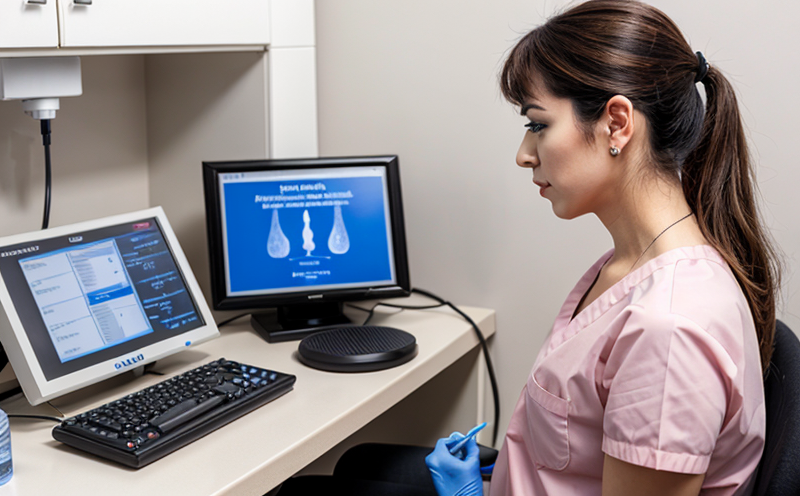Thyroid Hormone Disruption Testing in Ecotoxicology Studies
The thyroid hormone system plays a critical role in regulating metabolism, growth, development, and reproduction across various species. In the context of ecotoxicology studies, understanding how environmental contaminants affect this delicate balance is essential for assessing potential risks to ecosystems.
Thyroid hormones are produced by the thyroid gland and include thyroxine (T4) and triiodothyronine (T3). Disruption in their synthesis or function can lead to serious health issues, including hypothyroidism and hyperthyroidism. Ecotoxicology studies often focus on identifying endocrine-disrupting chemicals (EDCs), which can interfere with thyroid hormone signaling pathways.
Our laboratory provides comprehensive testing services for assessing thyroid hormone disruption in ecotoxicology studies. We employ advanced analytical techniques to detect even minute concentrations of EDCs and their metabolites, ensuring accurate measurement and interpretation. This service is particularly important for regulatory compliance and risk assessment purposes.
The process begins with careful selection of appropriate reference materials and quality control samples. Specimens are prepared according to standard protocols, taking into account factors such as matrix effects and sample stability. Instrumentation used in this testing includes high-performance liquid chromatography (HPLC), mass spectrometry (MS), and gas chromatography-mass spectrometry (GC-MS).
Once the samples are prepared, they undergo rigorous analysis to determine levels of thyroid hormones and potential EDCs. Reporting involves detailed documentation of all findings, including raw data, statistical analyses, and graphical representations where applicable. Compliance with international standards such as ISO 17025 ensures reliability and validity of our results.
This service is crucial for industries involved in manufacturing pharmaceuticals, agricultural products, or industrial chemicals that may have environmental impacts. By providing reliable evidence regarding thyroid hormone disruption caused by EDC exposure, we help clients make informed decisions about product safety and environmental responsibility.
Understanding the implications of thyroid hormone disruption extends beyond just ecological concerns; it also has significant public health relevance. Disruptions in these hormones can lead to developmental disorders, reproductive problems, and other serious conditions. Therefore, accurate identification and quantification of EDCs through our testing services contribute not only to better environmental protection but also improved human health outcomes.
In conclusion, thyroid hormone disruption testing plays a vital role in safeguarding both natural environments and public health by identifying harmful substances before they cause irreversible damage. Our laboratory offers state-of-the-art facilities and experienced professionals dedicated to delivering precise results that meet all relevant regulatory requirements.
Why It Matters
Environmental contamination from industrial activities or agricultural practices can lead to exposure of aquatic organisms, wildlife, and even humans to endocrine-disrupting chemicals (EDCs). These compounds mimic natural hormones like thyroid hormones, leading to hormonal imbalances that disrupt normal physiological processes.
- Impact on Wildlife: Exposure to EDCs can result in reproductive failure, reduced survival rates, and altered behavior among aquatic species. Such disruptions could lead to population declines or local extinctions if left unchecked.
- Human Health Risks: While the focus here is primarily on ecotoxicology studies, it's worth noting that similar effects observed in wildlife can also translate into human health risks via bioaccumulation pathways. For instance, certain EDCs have been linked to thyroid cancer and other cancers.
- Economic Implications: Loss of biodiversity due to contaminated waterways can negatively impact local economies dependent on fishing or tourism industries. Additionally, healthcare costs associated with treating illnesses related to hormonal imbalances could escalate significantly if proper preventive measures aren't implemented early enough.
Given these considerations, accurate and reliable thyroid hormone disruption testing becomes imperative for ensuring safe working conditions in factories producing EDCs and promoting sustainable agricultural practices that minimize environmental footprints. Implementing stringent quality control procedures during manufacturing processes can reduce the likelihood of accidental release into ecosystems.
Applied Standards
The testing conducted at our laboratory adheres to several internationally recognized standards designed to ensure accuracy, precision, and consistency across different laboratories performing similar analyses. These include:
- ISO/IEC 17025: This standard sets out requirements for competence in testing and calibration laboratories. It ensures that our methods meet rigorous quality assurance criteria.
- American Standard ASTM E1498: This practice covers procedures for sampling and analyzing water for organochlorine pesticides, which are known to interfere with thyroid hormone function.
- IUPAC Recommendations: International Union of Pure and Applied Chemistry provides guidance on sample preparation techniques that help maintain integrity during analysis.
By aligning our practices closely with these guidelines, we guarantee that clients receive results they can trust when making critical decisions about their operations or products.





